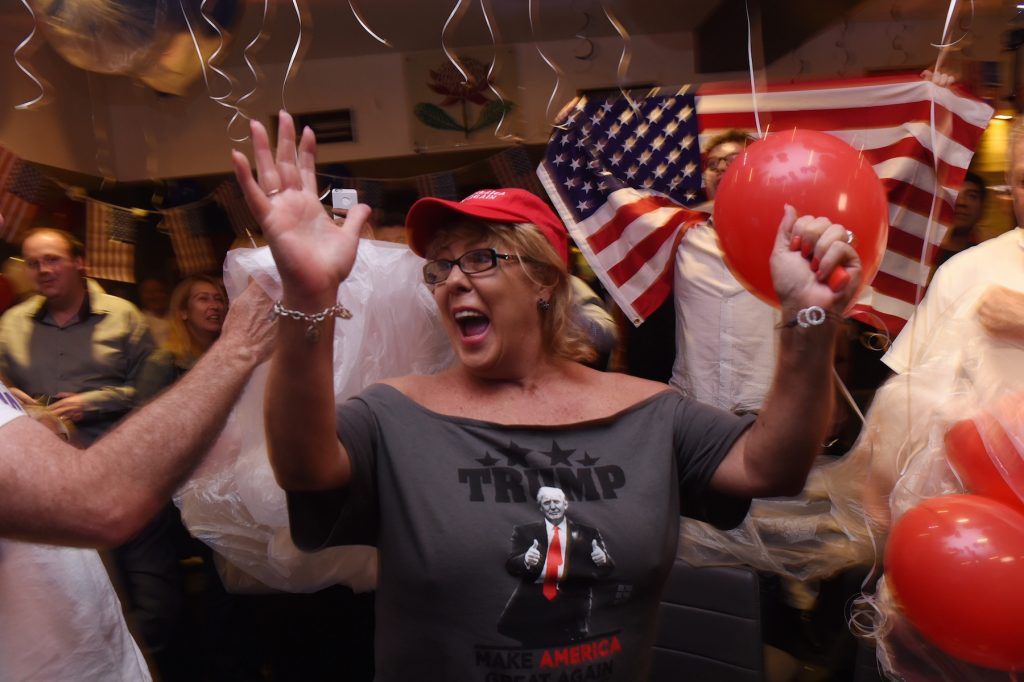What's going on?
Donald Trump has been elected the 45th president of the United States of America.
How did people react?
The world is shocked. Even the Trump HQ itself didn’t see it coming. Clinton’s campaign has yet to make a statement, but it seems like just about everyone else is tweeting their hearts out.
Lots of media outlets are talking about how ‘global markets’ are responding. They’re referring to how things like the value of currencies, company stocks, and government bonds are changing in reaction to the news.
So what's actually happening?
...to currencies
The biggest tangible change is a drop in the value of the Mexican peso, most likely because of fears of the damage Trump’s policy ideas (like building a wall to separate Mexico from the US) could cause to the country’s economy. The value of the dollar itself jittered over the course of the night, but is now looking fairly stable, which means that currency traders aren’t yet making drastic assumptions about how Trump’s policies will affect demand for American goods and services (and by extension, American dollars).
...to American businesses
The value of the stocks of America’s biggest companies (S&P 500, Nasdaq, Dow Jones), fell sharply overnight – and that’s just off the back of international traders (American stock markets hadn’t even opened yet). They’ve stabilized a bit now, but at a few percentage points lower than they were yesterday. What that means is investors in American businesses are losing faith in how well they’d be able to function under Trump, and expressing that concern by selling their stocks.
And it’s not just investors worrying – the CEOs of 1,100 US companies from Boeing to Coca Cola have published an open letter to Trump calling for him to restore trust in economic institutions. Only 17% of business groups thought a Trump presidency would be good news for their members, largely because of Trump’s dislike of international trade deals.
American companies who either produce or source a lot of their output abroad are worried about what Trump’s proposed trade barriers could do to their business model. A lot of people (including Trump supporters) feel American companies should hire American workers and use American materials – but that will mean significantly higher costs for companies and therefore higher prices.
Nothing concrete has happened yet, but the conversation will likely start soon on how American businesses trading abroad will function under a Trump presidency.
...to the rest of the financial world
International stock markets plunged when it became clear that Trump might win, as people in other countries are worried that Trump's policies will damage for their economies. The United States buys a lot of things from other places, and if it starts buying less – either because of more restrictive trade policies or a weakening economy at home – that’s bad news for the rest of the world too.
Okay, but what does that really mean?
It’s very likely that all the numbers we’re talking about here will change in a matter of hours. At the end of the day, ‘global markets’ are really only a representation of how confident people – and that’s everyone from professional traders, to anyone who holds any form of currency – feel about the economy at a certain moment in time.
As much as Trump’s ideas resonate with millions of Americans, they also worry many others, partly because of the political ideas they’re based on, but also because of a lack of trust that they are based on solid reasoning.
What happens now?
Everything we’ve heard and seen so far is based on people speculating how many of the things Trump campaigned for will actually happen, and what his presidency might mean for the world. We’ve still got another two and a half months of an Obama presidency before Trump even gets to call the shots, so while it’s worth keeping track of what these ‘global markets’ are up to, it’s also worth taking the speculation with a pinch of salt.

